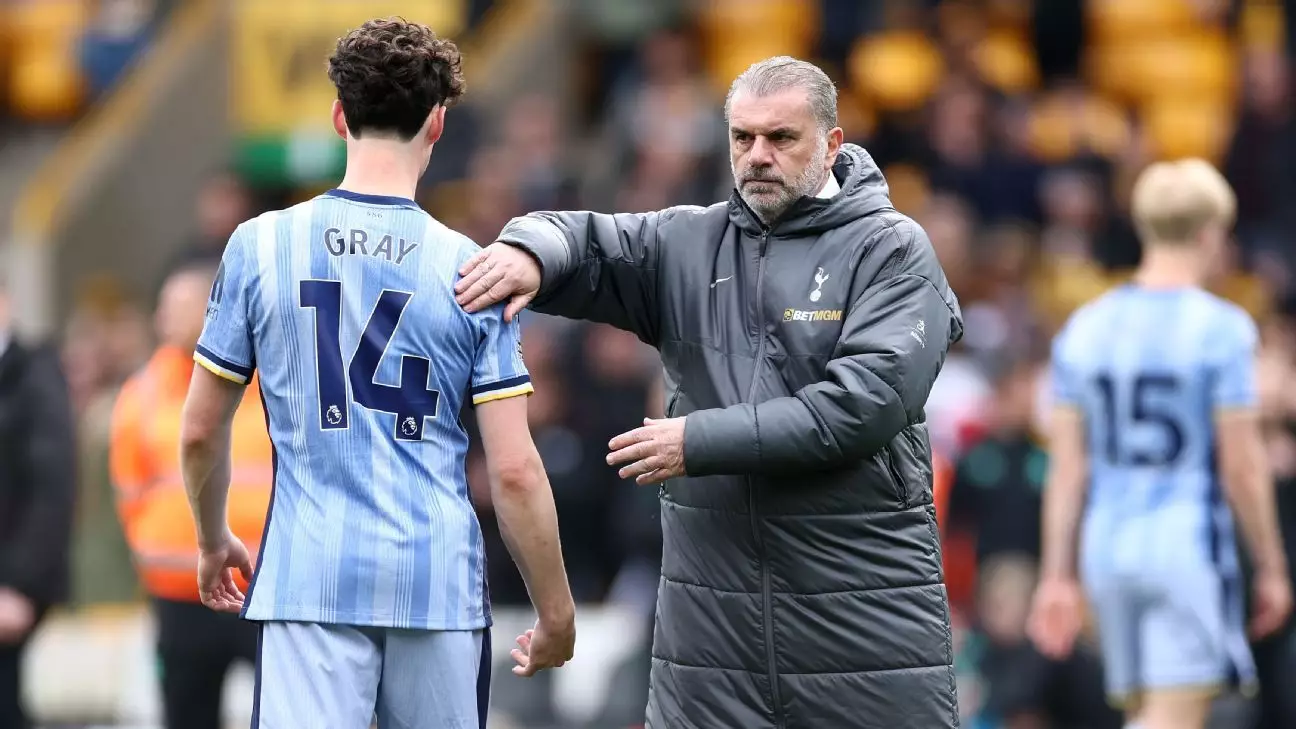Another weekend has passed, and once again, Tottenham Hotspur finds itself grappling with the specter of defeat. Following their alarming 4-2 loss to Wolverhampton Wanderers, questions abound regarding the future of head coach Ange Postecoglou. With Tottenham’s staggering tally of 17 league defeats this season, it is hard not to conclude that the club is sinking deeper into turmoil. The chronic mismanagement of the squad and glaring tactical ineptitude is evident to fans and analysts alike. How did a club with so much potential find itself in such a dire situation, and how long will the board tolerate this disarray?
The harsh reality is that Tottenham’s struggles are emblematic of deeper-rooted issues within elite football clubs. This season’s challenges cannot merely be attributed to injuries; the fault lines are visible in the team’s attitude, organization, and direction. From poorly executed substitutions to ineffective formations, Postecoglou’s approaches have raised eyebrows. In fact, losing 22 matches over two seasons is an alarming trend that should cause concern not just for coaches but for the entire footballing ethos at Spurs. That the club might already be eyeing replacements is a signal that reactionary measures are being prioritized over strategic development.
The Unfolding Title Race in LaLiga: A Beacon of Hope?
While Tottenham wallows in misery, the title race in LaLiga remains intriguing, though not without its own set of controversies. Real Madrid managed to secure a narrow win against Deportivo Alavés, preserving their hopes in the title chase, yet the drama surrounding star player Kylian Mbappé’s reckless red card steals headlines. Though Madrid has shown resilience amidst the chaos, the question remains: what price will they pay for Mbappé’s foolishness?
Mbappé’s suspension underscores the volatility of elite football; one moment of madness can alter not only a match but also a team’s trajectory during a critical juncture. The debate surrounding the adequacy of punishment looms large, as Madrid’s title aspirations come under threat. With Barcelona holding the reins of power, every match carries monumental weight, influencing not just standings but fan sentiments and club reputations.
Manchester City: A Glimpse of Revival Amidst Uncertainty
Contrastingly, Manchester City offered a show of resilience that may serve as an exemplar for struggling clubs. Although facing a challenging season, City rallied from a 2-0 deficit to claim a 5-2 victory, showcasing that even amid adversity, the champion’s spirit flickers. Kevin De Bruyne, while not at his dominant best, proved instrumental in orchestrating this comeback, reminding fans of his undeniable genius.
City’s path towards securing a Champions League spot appears precarious. The stakes are palpable—can they leverage this moment of triumph to regain their formidable stature? If winning the FA Cup and securing a Champions League place can indeed “save” their season, it will reflect the dual-edged sword of success and pressure that elite clubs face.
Bundesliga Drama: The Klassiker’s Mixed Signals
Meanwhile, the Bundesliga witnessed the 137th edition of Der Klassiker as Bayern Munich clashed with Borussia Dortmund. The match epitomized the broader challenges within German football: clubs steeped in history now battling for relevance amid shifting powers. The pulsating encounter, which culminated in a draw, highlighted both teams’ weaknesses, signaling that even giants can falter when it matters most.
Bayern’s inability to clinch a win against their fiercest rivals raises questions about their title ambitions. Despite the deep-rooted belief that Bayern will always stroll towards the trophy, the current climate hints otherwise, showcasing a league that is gradually evolving and equalizing. Dortmund’s mixed performance illustrates the fragile balance that underpins contemporary football—one day’s triumph can quickly spiral into defeat if complacency reigns.
The Broader Implications of Football’s Current Landscape
Across Europe, teams are grappling with the implications of not only their standings but also the psychological and reputational repercussions that accompany failure. The ramifications extend beyond the pitch and into the corridors of management, where decisions reverberate long after the final whistle. Clubs like Valencia and Villarreal are indicative of a shifting paradigm—teams once considered mid-tier now possess the potential to redefine their futures by capitalizing on their opponents’ weaknesses.
As we reflect on these developments, one cannot help but wonder if this turbulent cycle is a wake-up call for football’s elite. The traditional giants must adapt to a new era where tactical acumen, squad management, and strategic foresight are more important than ever. The need for structural reforms and visionary leadership has become ever more pressing, suggesting that the current state of play may very well serve as a catalyst for change within the sport.
In this complex web of victories, defeats, and uncertainties, it is clear that football is hurtling towards a reckoning. Clubs must confront their shortcomings, adapt to the evolving landscape, and innovate, or risk being left behind in an increasingly competitive world. The time for radical introspection and decisive action is now.

